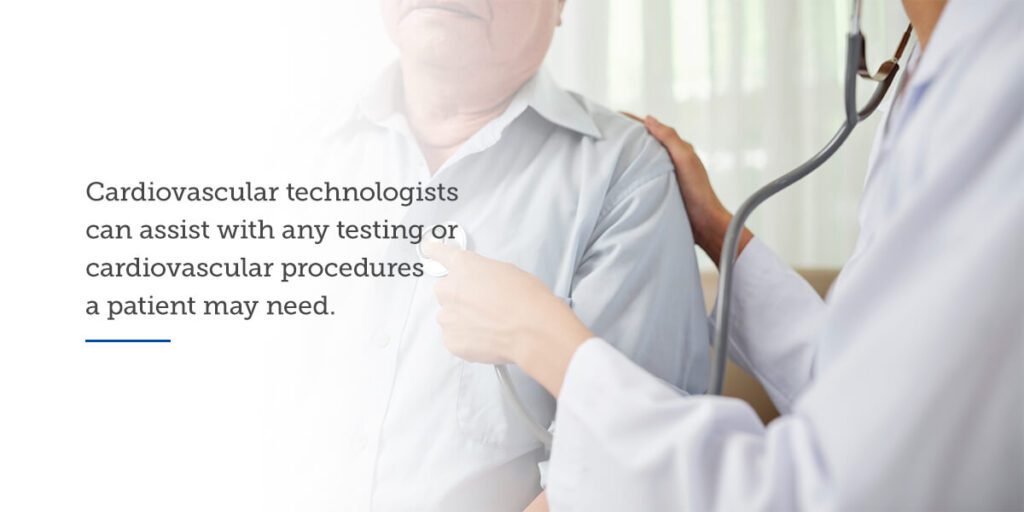A cardiovascular technologist is a medical professional who assists physicians in diagnosing patients with cardiovascular conditions. Cardiovascular technologists use various diagnostic tools to detect and diagnose vascular problems and ailments affecting the arteries, heart or valves. Learn more about how to become a cardiovascular technologist.
What Is a Cardiovascular Technologist?
A cardiovascular technologist is a medical professional that helps detect, diagnose and treat conditions related to the blood vessels and heart. Like many medical professionals, cardiovascular technologists spend most of their day on their feet, assisting patients with ultrasound scan of heart and veins.
Because a cardiovascular technologist works directly with patients, communication skills are essential, as well as a strong understanding of the technology used each day. These professionals can specialize in various practice areas, including invasive cardiology, vascular technology and cardiac sonography.
Cardiovascular technologist employment is estimated to grow 14% from 2020 to 2030, an above-average pace compared to all occupations.

What Does a Cardiovascular Technologist Do?
A cardiovascular technologist works directly with physicians to detect and diagnose peripheral vascular and cardiac diseases. They also help cardiologists and physicians deliver prompt treatments while working directly with patients and answering any questions they may have.
Cardiovascular technologists can also assist with any testing or cardiovascular procedures a patient may need. Other responsibilities include monitoring a patient’s heartbeat, scheduling appointments and reviewing documentation.
In addition to working with physicians and patients, cardiovascular technologists work closely with medical equipment and technology and are in charge of assessing and maintaining exam room. Although these are some of the most common tasks, each position is unique, and individuals in this role may also be in charge of other responsibilities when needed.
During a shift, this individual may register patients, update electronic health records and confirm medical history. Cardiovascular technologists may also perform electrocardiograms, non-invasive peripheral vascular tests, treadmill stress tests and more.
Depending on the position, a cardiovascular technologist may also assemble and operate hemodynamic or electrophysiologic equipment like an ECG monitor for interventional and diagnostic purposes. In addition to helping patients, one of the main goals of a cardiovascular technologist is to support physicians with related tasks.
How to Become a Cardiovascular Technologist
You will need to receive a cardiovascular technologist certification to begin your career. Enrolling in a cardiovascular technologist program can help you start a rewarding career working in the medical field. A cardiovascular technologist course is a two-year program with clinical experience, labs and traditional lectures.
During this program, you will learn the fundamental aspects of blood vessel and heart sonography, imaging techniques and some of the most common vascular conditions and ailments that affect the valves, blood vessels, arteries and heart.
A cardiovascular technologist externship provides first-hand experience working in a medical setting with guidance from site supervisors. An externship helps students translate their knowledge into physical skills and gain valuable connections with other professionals in the medical field.
Student externships occur at an affiliated facility and require clinical hours to be performed according to the program’s scheduling requirements. Before enrolling in a cardiovascular technologist program, potential students must hold a high school diploma or equivalent, a passing score on the Wonderlic exam, an interview, a statement of purpose and a minimum requirement of health and technical standards.
Career Outlook
Cardiovascular technologists rank #30 as one of the best health care support jobs. This professional can work in various settings and medical environments. Non-invasive imaging and diagnostics help physicians detect, diagnose and treat different cardiovascular conditions. Additional cardiovascular technologist opportunities are available in lab environments, including electrophysiology and non-invasive cardiovascular labs.
Salary
In 2020, cardiovascular technologists earned an average salary of $59,100. The top 25% highest earners had an average income of $78,170. Generally, cardiovascular technologists with more experience often earn more competitive salaries.
Additionally, cardiovascular technologists who specialize in specific fields may earn a higher income. Location also plays an important role in compensation, with some of the states offering the highest compensation for cardiovascular technologists including New York, New Jersey, California, Oregon, Rhode Island and the District of Columbia.
Job Satisfaction
A cardiovascular technologist is a rewarding career in the medical field with various opportunities to advance and earn a higher salary. While working in the medical field can sometimes be challenging, it is incredibly rewarding to help diagnose and treat various health conditions. This field also offers a healthy work-life balance with alternative scheduling and flexibility.
Unemployment Rate
There is a 7.4% unemployment rate among cardiovascular technologists. In most cases, this professional can work in hospitals, diagnostic labs and doctors’ offices. A lower unemployment rate means many cardiovascular technologists can find a job after completing their program.
Why Become a Cardiovascular Technologist?
Working as a cardiovascular technologist allows you to work with patients experiencing heart or cardiovascular complications. Benefits of becoming a cardiovascular technologist include:
- Helping people: One of the most rewarding aspects of becoming a cardiovascular technologist is working with people and helping them lead a healthy lifestyle. This individual works with a physician to detect potentially life-threatening heart complications and defects. Along with helping patients, these professionals can also develop close relationships with patients and team members.
- Job opportunities: There are numerous positions available for cardiovascular technologists, meaning many can secure a job as soon as their program ends. Unfortunately, heart disease is the world’s leading cause of death. Cardiovascular technologists are in high demand to combat the number of cardiovascular complications.
- Working with children: Depending on the specialty, cardiovascular technologists can work with children, infants or young adults, which can be incredibly rewarding for someone who enjoys working with these age groups. They can also specialize in patients over 65 if they prefer to work with a senior age group.
- Job satisfaction: Overall, cardiovascular technologists report high job satisfaction, primarily because they can work with others and make a positive change in someone’s life.
Visit Our Program Page for More Info
AIHT Education is a healthcare training school offering cardiovascular technologist training in Connecticut. Our goal is to provide students with quality education and training resources to be successful in the field of allied health sciences.
We empower our students with the values, knowledge and skills needed to be continuous learners. We strive to create an interdisciplinary academic environment built on collaboration, honesty and uniqueness. Our team is dedicated to offering various healthcare programs that prepare graduates for successful careers in the medical field.
Request more information today to learn more about becoming a cardiovascular technologist.





